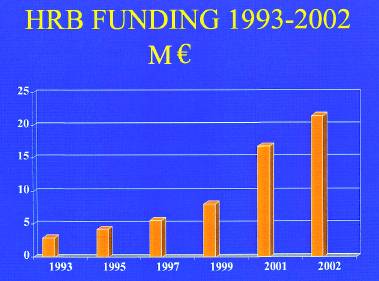| 2002 |

|
YEAR BOOK |
Health Research Board
|
The Health Research Board
|


HRB collaborative studies include investigating the genetic links for both alcohol dependence and schizophrenia. Research teams have contributed to understanding folic acid's role in preventing birth defects. The HRB also maintains databases that facilitate planning in the health services in psychiatric and disability services.
The HRB funds research in third level institutions and health organisations through competition and peer review. It supports young researchers' careers through its fellowship programmes.
Review of 2001
A highlight of 2001 for the HRB was the publication by Mr Miche�l Martin, Minister for Health and Children, of Making Knowledge Work for Health - A Strategy for Health Research in September 2001. This document marks a watershed in support for health research in Ireland. In it the Government recog- nises the important contribution Irish researchers can and are making to the global search for understanding of health, disease and disability. It acknowledges the link between a world class health service and the development of a strong research and development function in the health services. It emphasises the contribution health research can make to building peace on the island of Ireland and to building a strong, knowledge-based economy and society.
Making Knowledge Work for Health commits the Government to much greater support for what it calls 'science for health', that is investigator-led, bottom-up research, funded competitively and following national and international peer review. More radically, it commits the Government to building a strong culture of research and development in the health services. Such a culture will help build a world-class health service by supporting research linked to achieving the main objectives of the health system. It will encourage the growing commitment to evidenced-based decision making by health professionals, and measuring the effectiveness of health interventions.
The Health Research Board (HRB) was delighted that the research strategy was endorsed by the national health strategy � Quality and Fairness - A Health System for You published by Minister Martin towards the end of 2001. The Board is pleased that the Government's proposals in relation to health research have been so well received and that there is such a widespread commitment to implement them.
Funding for health research has increased significantly over the past five years. The expenditure of the Board grew from just over �5m in 1997 to �22.5 in 2002, a four and a half fold increase. The Board is most grateful to the Minister and his Department for the dramatic increase in support for health research and for their confidence in the benefits of investing in such research.
Increased funding leads to improved patient care
The board's increased budget in 2001 was particularly gratifying, growing to �13.2m from �9.3m in 2000. It enabled the Board to invite proposals for programme grants. These major five year awards support multidisciplinary teams in different institutions working on integrated research programmes. Programme awards support senior researchers and provide high-class training for young scientists and clinicians. The HRB received 104 expressions of interest in response to the Board's call and, of these, 40 detailed applications were invited. Following international peer review, the Board made 12 programme grant awards worth over �12m in the five years to 2007. These awards will contribute to improved patient care, and more effective health services raise the profile of Irish health research internationally. This investment represents a major step towards the implementation of the commitment to supporting science for health inMaking Knowledge Work for Health .
The emergence of a number of government agencies supporting research generated debate in 2001 about how best to coordinate their activities to maximise synergies and reduce duplication of effort and funding. Discussions took place between the key agencies concerned to agree an approach to working together and a structure in which to do so. An agreed statement was signed in early 2002 by the HRB, the Higher Education Authority, the Irish Research Council for Science, Engineering and Technology, the Irish Research Council for Humanities and Social Sciences, and Enterprise Ireland. The HRB is the coordinating group for the first year.
Physician Scientists
If the board has one disappointment, it is with the lack of progress in agreeing changes to the contract governing the appointment of medical specialists to allow the appointment of physician scientists. Physician scientists have a major commitment to research and a minor commitment to teaching and patient care. Making Knowledge Work for Health rightly identifies the appointment of physician scientists as critical to building the capacity in this country to conduct world-class health research. The board hopes that the problems that have delayed agreement on the creation of these posts will be overcome without further delay.
Contact: Dr Ruth Barrington, Chief Executive,
HRB, 73 Lower Baggot Street, Dublin 2;
Tel: 676-1176; Fax: 661-1856;
E-mail: [email protected] ; Web: www.hrb.ie